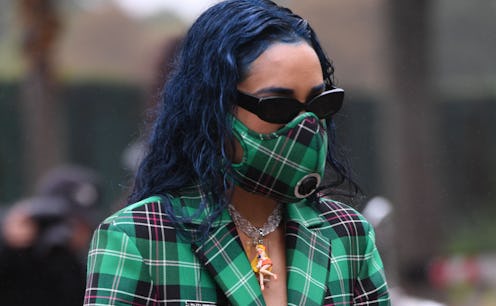(Beauty)
The Definitive Guide To Getting Rid Of “Maskne”

Unfortunately, COVID-19 has expanded our vocabularies in ways we didn’t think possible just a few months ago. (Personally, I would love to return to a time when I had no idea what social distancing was). Enter: acne from face masks, or "maskne." Perhaps you’ve already come across this new word used to describe the acne occurring as a direct result of our new realities covering 75 percent of our faces whenever we go outside. Before we get into how to deal (with help from top dermatologists), first: a primer on what maskne is and why it's happening.
“All masks — whether they are cotton, surgical paper, or N95 — create a seal over the face, allowing sweat and humidity to be trapped inside,” New York City-based dermatologist Dr. Morgan Rabach, MD, tells TZR. For those on the frontlines who are constantly wearing the most intensive types of masks (like ones with wire at the bridge of the nose for a tighter seal), the bumps are a manifestation of acne mechanica, a form of acne that results from excess friction, heat, pressure, or a lack of air. That is to say, a mask trapping heat, rubbing against the skin, and precluding it from contact with air is basically a perfect storm. (In normal life, acne mechanica commonly occurs in places like under football players’ shoulder padding.)
For those of us who are wearing cloth masks ordered online or even fashioned from old garments, it’s more likely that skin problems are occurring as a result of a different type of reaction. This could be from “sensitivity to fabrics, dye in fabrics, laundry detergent and softeners which can lead to a dry irritation or contact or irritant dermatitis,” Rabach says. If you suspect you might fall into this camp, look for irritant and fragrance free detergents, like All Free & Clear or Dreft to help prevent a reaction.
“You are breathing in your humid breath, and instead of escaping into the environment, it is trapped,” notes Dr. Ranella Hirsch, MD of Cambridge, Massachusetts, who likens the scenario to wearing workout clothes for too long after exercise.
Finally, our routines have changed in various ways that can show up on our skin, beyond just "maskne." Dr. Rabach points to potential culprits including decreased facials, more sitting around touching your face, and less-than-healthy snack foods.
The good news is that there are definitely steps we can take to help our skin.
Acne From Face Masks: Wash Your Face Covering
“If you’re wearing the same bandana or cloth masks everyday, remember to treat it like anything else worn close to the body and wash it regularly,” Dr. Hirsch says.
Acne From Face Masks: Wash Your Face, Too
In addition to washing your mask, make sure to be diligent about washing your face — before putting the mask on for the day, and again once you are home and can safely remove it. If you’re acne-prone, dermatologists recommend using a cleanser with salicylic acid, which is gentle enough not to cause further irritation, but efficacious in helping unclog pores. They advise against scrubbing — you can use a chemical exfoliant (again, look for salicylic acid) to help keep pores clear. Want to treat yourself? “A gentle massage using a cold jade roller can be soothing and help with swelling around the mask borders,” Nanuet, New York-based dermatologist Dr. Heidi Waldorf, MD, says.
We only include products that have been independently selected by The Zoe Report’s editorial team. However, we may receive a portion of sales if you purchase a product through a link in this article.
Acne From Face Masks: Skip The Makeup
Makeup under a mask is a bad idea, because it's just another thing "adding to the occlusion mess," Hirsch says, referring to the trapped sweat and oil already happening under a mask. "Not to mention, heavy makeup can impact the mask seal," she notes, which is the last thing anyone wants! Stick to strong brows and a statement eye if you want to wear makeup, and skip anything concealed by your mask (i.e. blush, lipstick, etc).
Acne From Face Masks: Add A Barrier
To take your preventative measures to the next level, New York City dermatologist Dr. Jeremy Brauer, MD recommends finding ways of decreasing the friction or pressure, “such as the placement of thin barriers, like soft gauze or thin hydrocolloid dressing — as long as you are able to maintain an appropriate seal.” You can also use a barrier-forming product to protect the skin. Waldorf recommends Desitin (yes, as in the diaper rash cream), because it literally creates a physical barrier between the mask and your skin that helps prevent irritation and moisture.
Acne From Face Masks: Support Your Skin Barrier
Regardless of your skin type, make sure to keep skin hydrated with a simple moisturizer. "When your baseline is irritation, you want soothing hydration," Hirsch says. She recommends ingredients like ceramides. Skip the one loaded with active ingredients for now. “To minimize dryness likely caused by the pressure and friction experienced at various pressure points of the mask, a non-comedogenic moisturizer may be beneficial,” Brauer says.
If you think you’re showing symptoms of coronavirus, which include fever, shortness of breath, and cough, call your doctor before going to get tested. If you’re anxious about the virus’s spread in your community, visit the CDC for up-to-date information and resources, or seek out mental health support.